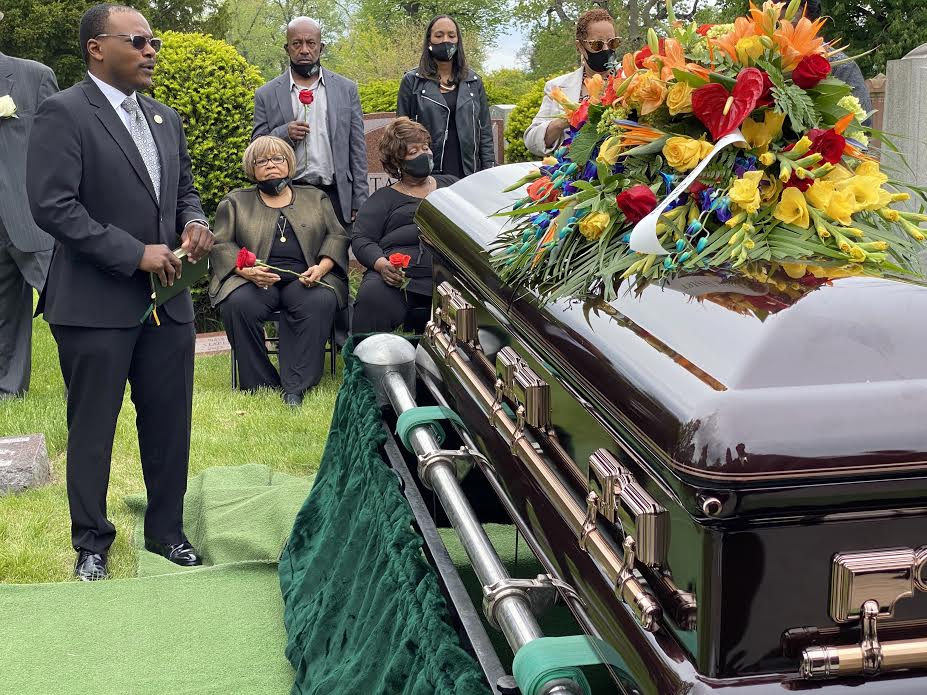The room was packed. Mourners kept coming. But when the song “I’ll Take You There” was played, it was time to celebrate the life of a member of Chicago’s royal family of Gospel music.
It was a spirited homegoing service for Pervis Staples, a founding member of the world-famous Staple Singers. The only son of the late Roebuck “Pops” Staples, Pervis’ life took center stage on Monday, May 17, at Leak & Sons Funeral Homes in Chatham. Some cried, but many more laughed as friends and family shared memories of a funny and ambitious man who impacted Black Chicago’s musical landscape.
Pervis died on May 6 in the Dolton, IL, home that the Staple Singers owned for more than six decades. His death leaves the group’s lead vocalist Mavis Staples as the last surviving member of the Staple Singers.
She was there at her brother’s funeral Monday. The room was suddenly quiet when Mavis arrived shortly after her brother’s wake began at 10 a.m. She wore all Black pants and matching blouse with muted gold jacket. At just five feet tall, she somehow had the commanding presence of a queen as she entered the room. Throughout the morning, she remained silent as she sat a few feet away from her brother’s brown and gold-trimmed casket, where he was dressed in a brown suit with a folded American flag at his side to honor his service in the U.S. Army.
Many floral arrangements flanked Pervis’ casket. Two from Mavis included a heart shaped arrangement with carnations and roses.
The room grew packed with mourners and many kept coming as the line to view Pervis’ body went out the door of the chapel. In a sign that COVID-19 restrictions were easing, mourners wearing masks filled every pew and were asked to sit closer to each other to accommodate the growing crowds.
The service was just under two hours. A glossy, eight-page program was filled with pictures of Pervis with his famous family that includes his father, “Pops,” mother, Osceola, and sisters, Cleotha, Yvonne, Cynthia and Mavis. All of them are gone except Mavis, who at 81 is still performing at events and concerts. She didn’t speak during her brother’s funeral but at times laughed and stood up as soloist Kim Stratton belted out an emotional musical tribute to Pervis.
The overall mood was more joyous than sorrowful as one friend after another shared their moments with Pervis.
Viria Hollins, a widow, said Pervis was a devoted friend, who joined her on two-hour walks through Jesse Owens Park at 5:30 in the morning because he didn’t feel it was safe for her to be walking alone.
“He had a keen eye for music. So, I got accustomed to him getting in my car and correcting my sound system. We would have long conversations in person, but short ones over the phone.”
The room burst with laughter when Hollins said, “He was known to quickly hang up during phone conversations. He was a true family man. He would resist any temptation that could cause him to harm the Staples’ name. He was a good son and brother.”
Jerry Redd, another friend, said Pervis was one of the best friends that he ever had.

“He was a caring person, he had a good heart. He had plenty of wisdom. I learned a lot from him. He would always say, Jerry let me tell you something, no matter what you do, people are going to say what they want to say, but you have a right to be wrong.”
Pervis Staples was born in Drew, Mississippi, on November 18, 1935. His parents later moved to the South Side of Chicago to provide a better life for Pervis and his older sister Cleotha. In Chicago, the Staples’ family would grow to include Yvonne, Mavis and Cynthia. To support their family, “Pops” worked at the Union Stockyards.
Pervis attended Doolittle Grammar School and Dunbar Vocational Academy in Bronzeville, the same alma mater as his late childhood friend, prominent singer Lou Rawls. Pervis was also friends with Gospel R&B great Sam Cooke and musician Jerry Butler, who also formerly served as the Third District Cook County Commissioner.
Pervis learned Gospel music from his father. When the Staple Singers were formed in 1948, Pervis sang tenor. His voice complemented Mavis’ rich, contralto vocals. Prior to joining the Staple Singers, Pervis had performed at schools and events in Chicago. The group cut songs with local labels United Records and Vee Jay Records, the second largest Black-owned label after Motown Records. With Vee Jay Records, Pervis and the group recorded several songs, including “Uncloudy Day” and “Will the Circle Be Unbroken.”
It was Pervis who tried to persuade his father to have the group sing secular songs as Cooke and another Gospel titan Aretha Franklin, who both had experienced crossover success.
Pervis left the group in 1969 and began managing the Hutchinson Sunbeams, a Chicago group who later became The Emotions. Pervis also operated Perv’s House, a nightclub on 79th Street on the South Side.
Pervis left the Staple Singers before the group signed with Stax Records where they would record some of their biggest hits, including “Respect Yourself” and “I’ll Take You There.” The group’s song became the soundtrack of the Civil Rights Movement and a favorite of Dr. Martin Luther King, Jr. They later recorded a secular hit “Let’s Do It Again” with Chicago’s Curtis Mayfield’s Curtom Records.
After Pervis left the group and served in the Army, his sister Yvonne stepped in. In the military, Pervis served in the U.S. Army Choral Group.
In 1998, Pervis and the Staple Singers were inducted into the Rock and Roll Hall of Fame. Pervis is survived by Mavis, six children, seven grand- children and seven great-grand- children. He was buried in the Staples’ family plot at Oak Woods Cemetery.
Reverend Otis Moss III, from Trinity United Church of Christ, closed out the ceremony with a powerful 13-minute speech titled “Pervis’ House.” The eulogy was bas- ed on the parable in the biblical book of Matthew about the wise man who built his house on a rock instead of sinking sand. Moss said Pervis’ house was deeply rooted in the community, where he established strong relationships with private and prominent residents.
“We celebrate a brother by the name of Pervis. You know that when you build your house on this kind of rock, you have a blessed assurance because you know that there is someone who has already prepared a place for you. There’s a place where ain’t nobody crying, a place where ain’t nobody worrying.”






